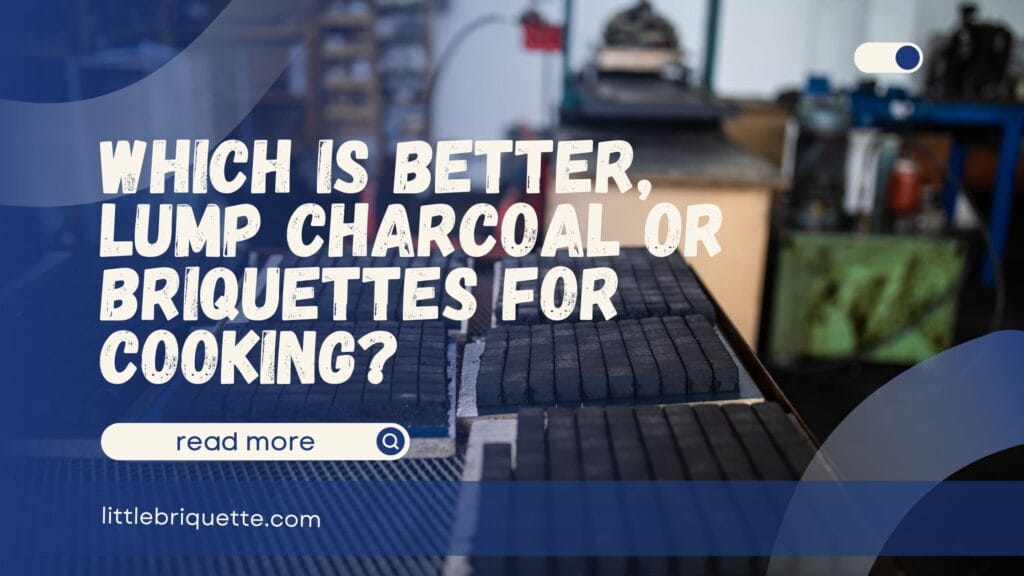When planning the perfect cooking session, one element is often overlooked: the type of charcoal to use. The choice between lump charcoal and coconut shell briquettes can make a significant difference in the flavor, temperature, and cooking time of your dishes. Do you want the authentic taste produced by hardwood charcoal, or do you prefer the convenience and temperature stability of coconut shell briquettes? Let’s discuss in more detail which is better: lump charcoal or briquettes for cooking?
Which is Better, Lump Charcoal or Briquettes?
Lump charcoal is made from wood that has been burned without oxygen, resulting in lightweight, dense pieces of wood. The manufacturing process involves burning wood in a closed chamber called a kiln, where high temperatures remove moisture and other organic compounds, leaving behind the remaining carbon.
The characteristics of lump charcoal include varying sizes, irregular shapes, and higher density compared to briquettes. This results in fast burning and high temperatures, making it ideal for grilling that requires intense heat.
On the other hand, coconut shell briquettes are a fuel source made from crushed coconut shells that are compressed into briquette form. The production process involves drying the coconut shells, crushing them into powder, and then compressing them using high pressure, sometimes with the addition of natural binders.
One of the main advantages of coconut shell briquettes is their more environmentally friendly nature, as they are a byproduct of the coconut industry, supporting sustainability. Additionally, these briquettes produce less smoke and have a longer burn time, making them an efficient and clean choice for various cooking methods.
Read Also: Are Charcoal Briquettes Toxic? Learn More About Their Benefits!
Advantages and Disadvantages of Cooking Fuels
Which is better, lump charcoal or briquettes? These two fuels used in cooking have their own advantages and disadvantages. To help you understand and choose based on your needs, here’s a comprehensive explanation.
Advantages and Disadvantages of Lump Charcoal

As a cooking fuel, lump charcoal made from wood has its own pros and cons. Here’s a detailed look at its advantages and disadvantages.
Advantages of Lump Charcoal
One of the main advantages of lump charcoal is its fast burning rate. Thanks to its manufacturing process, which produces dense wood pieces, lump charcoal ignites and reaches optimal temperatures quickly. This is very beneficial for cooks and grillers who want to start cooking without long waits. This speed makes lump charcoal an ideal choice for urgent grilling situations where time is crucial.
Additionally, lump charcoal can generate very high temperatures, providing excellent temperature control during the cooking process. This allows grillers to employ more complex cooking techniques, such as perfectly searing meat. The flavor produced is also very authentic, as this charcoal is made from natural wood, giving food a distinctive smoky aroma. This makes lump charcoal highly popular among barbecue enthusiasts who desire the authentic taste of their dishes.
Disadvantages of Lump Charcoal
Despite its many advantages, lump charcoal also has some drawbacks. One of the most significant is its shorter burn duration, which means it depletes faster compared to briquettes. This can be a drawback, especially when cooking for a large number of guests or during long barbecues, as you may need to add charcoal periodically. This can disrupt the cooking flow if you’re not prepared with extra charcoal supplies.
Another downside is that it tends to be more expensive. Lump charcoal is usually marketed at a higher price than briquettes, which can be a consideration for those on a budget. Additionally, lump charcoal produces more smoke than briquettes, which can be an issue if you’re cooking in an open area with many people. This smoke can affect the aroma and flavor of the food if not managed properly, so it’s important to consider this factor when choosing the type of charcoal to use.
Advantages and Disadvantages of Coconut Shell Briquettes

In addition to lump charcoal, coconut shell briquettes are also a favorite choice in cooking activities. Here are the advantages and disadvantages of coconut shell briquettes.
Advantages of Coconut Shell Briquettes
The main advantage of coconut shell briquettes is their longer burn time compared to other types of charcoal. This is due to the briquette manufacturing process that compresses coconut shells, resulting in high-density charcoal that lasts longer when used. With a longer burn time, you don’t have to worry about frequently adding charcoal, making it ideal for extended cooking sessions like barbecues or roasting. This also allows you to cook various types of food simultaneously without having to rush.
Additionally, coconut shell briquettes produce less smoke and odor compared to lump charcoal. This makes them more comfortable to use in open areas, where the presence of smoke can disrupt the comfort of guests. Less smoke also means that the natural aroma of the food will be more pronounced, without contamination from charcoal smoke. Furthermore, these briquettes provide more consistent temperatures, which is important for even cooking results. This advantage allows you to have better control over the cooking process and achieve better results.
Disadvantages of Coconut Shell Briquettes
On the other hand, coconut shell briquettes may take longer to reach optimal temperatures compared to lump charcoal. This heating process can be a drawback, especially if you want to start cooking immediately. Users need to be patient and ensure that the briquettes are fully heated before preparing the food, which can disrupt the cooking flow, particularly in time-sensitive situations like parties or events.
Another consideration is that some coconut shell briquettes may contain additives, such as chemical binders used to compact the briquettes. Although most high-quality products are made from natural and environmentally friendly materials, it’s important to check the labels and ensure that the chosen briquettes do not contain harmful additives. These additives can affect the taste of the food and health, so selecting the right product is crucial for those concerned about the quality of their cooking and the environment.
Read Also: Trail of Innovation – Who Invented Coconut Charcoal Briquettes?
Purchasing High-Quality Coconut Shell Briquettes
To achieve perfect cooking results with delicious flavors and aromas, it’s important to ensure that the coconut shell briquettes are of high quality. You can find briquettes made from natural materials sourced from Sumatra coconuts with certified production processes only at Little Briquette. Contact the admin number here to get coconut shell briquettes in bulk.

